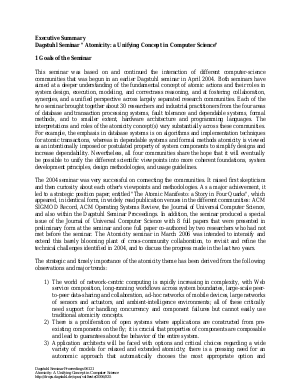06121 Executive Summary – Atomicity: A Unifying Concept in Computer Science
Authors Gerhard Weikum, Clifford B. Jones, David Lomet, Alexander Romanovsky
-
Part of:
Volume:
Dagstuhl Seminar Proceedings, Volume 6121
Part of: Series: Dagstuhl Seminar Proceedings (DagSemProc) - License:
 Creative Commons Attribution 4.0 International license
Creative Commons Attribution 4.0 International license
- Publication Date: 2006-11-27
File

PDF
DagSemProc.06121.2.pdf
- Filesize: 28 kB
- 4 pages
Document Identifiers
Subject Classification
Keywords
- Atomicity
- concurrency
- system structuring
- abstraction
- fault tolerance
Metrics
- Access Statistics
-
Total Accesses (updated on a weekly basis)
0Document
0Metadata
Abstract
This seminar was based on and continued the interaction of different computer-science communities that was begun in an earlier Dagstuhl seminar in April 2004. Both seminars have aimed at a deeper understanding of the fundamental concept of atomic actions and their roles in system design, execution, modeling, and correctness reasoning, and at fostering collaboration, synergies, and a unified perspective across largely separated research communities. Each of the two seminar brought together about 30 researchers and industrial practitioners from the four areas of database and transaction processing systems, fault tolerance and dependable systems, formal methods, and to smaller extent, hardware architecture and programming languages. The interpretations and roles of the atomicity concept(s) vary substantially across these communities. For example, the emphasis in database systems is on algorithms and implementation techniques for atomic transactions, whereas in dependable systems and formal methods atomicity is viewed as an intentionally imposed or postulated property of system components to simplify designs and increase dependability. Nevertheless, all four communities share the hope that it will eventually be possible to unify the different scientific viewpoints into more coherent foundations, system development principles, design methodologies, and usage guidelines.
Cite As Get BibTex
Gerhard Weikum, Clifford B. Jones, David Lomet, and Alexander Romanovsky. 06121 Executive Summary – Atomicity: A Unifying Concept in Computer Science. In Atomicity: A Unifying Concept in Computer Science. Dagstuhl Seminar Proceedings, Volume 6121, pp. 1-4, Schloss Dagstuhl – Leibniz-Zentrum für Informatik (2006)
https://doi.org/10.4230/DagSemProc.06121.2
BibTex
@InProceedings{weikum_et_al:DagSemProc.06121.2,
author = {Weikum, Gerhard and Jones, Clifford B. and Lomet, David and Romanovsky, Alexander},
title = {{06121 Executive Summary – Atomicity: A Unifying Concept in Computer Science}},
booktitle = {Atomicity: A Unifying Concept in Computer Science},
pages = {1--4},
series = {Dagstuhl Seminar Proceedings (DagSemProc)},
ISSN = {1862-4405},
year = {2006},
volume = {6121},
editor = {Clifford B. Jones and David Lomet and Alexander Romanovsky and Gerhard Weikum},
publisher = {Schloss Dagstuhl -- Leibniz-Zentrum f{\"u}r Informatik},
address = {Dagstuhl, Germany},
URL = {https://drops.dagstuhl.de/entities/document/10.4230/DagSemProc.06121.2},
URN = {urn:nbn:de:0030-drops-8358},
doi = {10.4230/DagSemProc.06121.2},
annote = {Keywords: Atomicity, concurrency, system structuring, abstraction, fault tolerance}
}
